Article by Kora Klapp, co-authored by Tricia Mitchell
The legacy
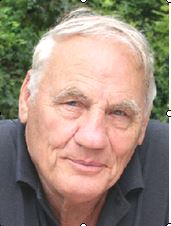 In 1981, a legacy became the footing of a new concept of cancer as a response to trauma:
In 1981, a legacy became the footing of a new concept of cancer as a response to trauma:
the bright German internist Dr Ryke Geerd Hamer MD had, in the wake of his own experience of losing his beloved son caused by a tragic and dramatic incident, developed a tumour in the testicles. He paid attention to this coincidence especially when his son appeared to him in dreams, confirming not only that the location a tumour appears in had significance relevance to the kind of trauma, but that relief of that trauma caused the growth to stop immediately! [1]
Hamer found the opportunity to research his thesis working as senior physician in a cancer clinic. He developed an encompassing theory of how
- various organs and tissues will react in specific ways upon trauma impact to the brain,
- this reaction is related to the organ tissue’s embryological origin.
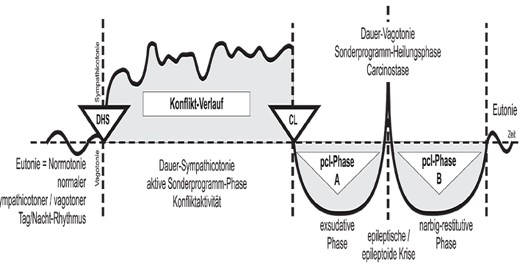 Hamer also posited that the affected organ part had an obvious or associated function specific to the trauma experienced. He also established a typical timeline in cancer development and regression, triggered by the impact of trauma, and its resolution. This included the effect of fever and acute inflammation or infection.
Hamer also posited that the affected organ part had an obvious or associated function specific to the trauma experienced. He also established a typical timeline in cancer development and regression, triggered by the impact of trauma, and its resolution. This included the effect of fever and acute inflammation or infection.
His findings partly aligned with contemporary psychosomatic medicine and oncology [2,3], but the medical and scientific society rejected Hamer’s dismissal of traditional oncological and medical perspectives on the causes of, and cures for, cancer. They also dismissed his concept of treating the body as a biological system, which Hamer generalised and called “the biological laws of nature”.
Nevertheless, it was a breakthrough as an optimistic outlook that cancer can, under certain circumstances, self-heal and doesn’t need toxic treatment, but rather requires supporting the body’s capacity to self-regulate! This has, in many cases, proven true. [3,4]
Mind-body medicine has roots as long as humankind. However, attempting to analyse, understand & conceptualise how the mind-body connection works, so health data can be interpreted and outcomes ‘predicted’ can be extremely complex. The human body is not a machine; and the mind is yet harder to grasp by scientific studies [5] – is the term “mind” even clearly defined and measurable? What has historically been missing from mind-body medicine is consistent results. Dr Hamer’s work sought to provide that missing link.
Dr Hamer made an attempt to categorize mind-body reactions leading to functional tissue changes as “biological conflicts” that do appear in nature, where they usually will be timely resolved. The human mind however will interpret a biological function quite creatively – and can tie the fear of losing an income source to physical starvation, leading to an increase in functional tissue to break down food and use nutrients. Different ways of functional organ change were identified as belonging to the “survival/old brain” and the “social/new brain”.
To bring a patient closer to the origin of their disease, through awareness, and to have them identify specific events as causative, can empower them in gaining control over unconscious thoughts and processes. And this will support their feel-good hormones and their self-regulation aka the immune system. Hooray!
But experience teaches us that bringing these hidden thoughts into consciousness, and transforming them into sustainable healing needs some help. This is where “Meta-Medicine” first came in.
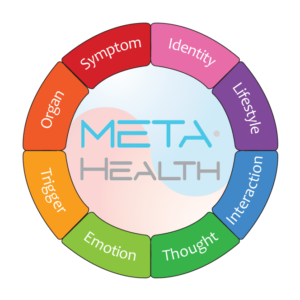
The practice of Trauma Healing for physical health
The founders of Meta-Medicine (in 2004), Johannes Fisslinger and Dr Anton Bader MD, as well as the first members, already practiced different sorts of mind-body medicine and methods for trauma healing, and Dr Hamer’s concept provided the perfect foundation for root-cause therapy. Following this route, a methodology for holistic health was developed and taught to healthcare professionals as well as to interested persons outside of health-related fields. This methodology was renamed META-Health in 2013 for further development and to place an emphasis on health, rather than disease.
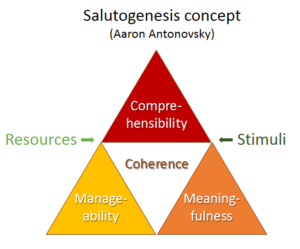 Applying the well-established Salutogenesis concept [6], META-Health focuses on 8 milestones designed to:
Applying the well-established Salutogenesis concept [6], META-Health focuses on 8 milestones designed to:
- support individuals to develop consciousness about the roots of health, or causes of dis-ease,
- integrate that knowledge with innate wisdom
- motivate and establish a compassionate, wise and distinct way to support individual health
- design a lifestyle that fosters resilience.
Along the way, certain aspects of Dr Hamer’s “New Medicine” were challenged – as an example, the existence of viruses per se is not denied, and the problematic role of certain microbes is not underestimated by a META-Health Practitioner. While the role of “brain relays” to specific organ tissues could not be generally validated (the origin and mechanism of “Hamer foci” is still unclear), contemporary science finds brain connectivity and neuroplasticity to react upon our environment, being imprinted and reinforced by significant emotional experiences, and this definitely affects also our cells and tissues. In this way, Dr Hamer’s theory is validated and refined by the research about the Cell Danger Response, the healing cycle and salugens that Prof Robert K Naviaux has published [7].
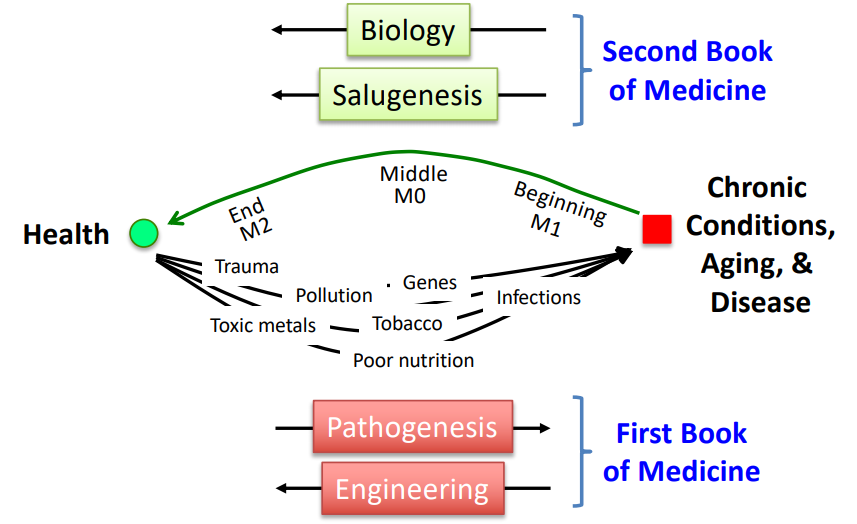
Openness to integrate own experiences and new scientific findings into the working concept distinguishes the development in META-Health [8].
The nature of the human mind, its imprinting and its creativity to influence our biology is a main focus in META-Health. While conflicts and trauma directly impact and alter the working of our brain and body, we clearly have resources available to lift us – in due time and in facing reality – into a meta-position where we can find consolation and inner peace. Our mind is even capable of reversing the impact of previous trauma that had haunted us ever since, or of incidents that had been hidden from conscious access, but yet still influences our body!
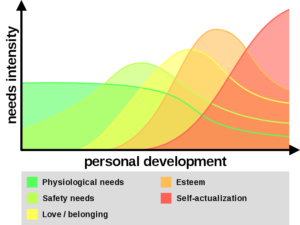 To use the faculties of our mind to overcome biological conflicts, and to align split aspects of our self is going beyond Dr Hamer’s practice and teachings in “German(ic) New Medicine”. META-Health perceives the brain and body to be images for the working of the mind, making it tangible and giving a frame for interaction, rather than the brain being the computer solely responsible for relaying and directing all organs to react.
To use the faculties of our mind to overcome biological conflicts, and to align split aspects of our self is going beyond Dr Hamer’s practice and teachings in “German(ic) New Medicine”. META-Health perceives the brain and body to be images for the working of the mind, making it tangible and giving a frame for interaction, rather than the brain being the computer solely responsible for relaying and directing all organs to react.
We recognise that we human beings are complex creatures. We have biological needs, socially created desires, and intellectual ideas that can either support those needs and desires, or conflict with them, creating inner dissonance. Only with the understanding of each of those levels are we capable of dissolving the inner tensions that give rise to chronic dis-ease and, or escalating symptoms [9].
The methodology
The practice of META-Health is used in these forms:
META-Analytics: the collecting information relevant for assessing the background and development of sensitivities and non-resilient states in individuals and in ecosystems.
META-Awareness: the consequences of understanding and analysing on the level of (self-)responsibility, acceptance and potential.
META-Coaching: helping other persons towards META-Awareness, self-regulation, healing and resilience ; co-regulation
META-Therapy: use of effective methods based on META-Analytics for
- Emotional processing of trauma and significant experiences
- Cognitive processing and transformation of stress (reframing)
- Pain management and release
- Self-regulation (by self-care)
- Orientation towards health and resilience (find a vision and develop confidence)
- Motivation and perseverance
- Lifestyle choices to support the individual’s goal and sustainability of results on the physical, mental and social systemic levels.
Effective methods use navigation of cerebral and neurological functions and states, energy distribution and modulation of hormones, by conscious and unconscious means. [10]
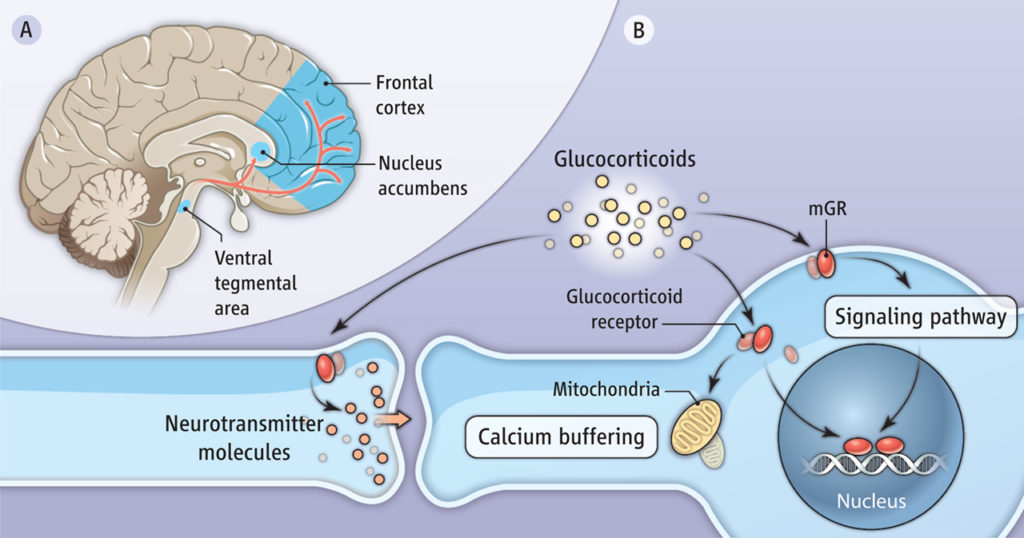
There is a lot we can do, and often must do, to convince biological programs such as the employee’s starvation program of a change in perception or to “finish healing”, as the threat to survival is no longer held true [11].
The concept of GNM was thought by Dr Hamer to be a therapy per se [12]. However it proved to have some hooks that META-Health practitioners are aware of and can deal with:
- when resolution of conflicts leads to regeneration characterized by pain and more or less dramatic symptoms, this understanding generates expectations and fear of these symptoms. Experience shows, however, that resolutions in general, especially when creating a resourceful environment, do not necessarily result in swellings and pains.
- On the contrary, such symptoms are signalling that the circumstances need to be ameliorated. Again, this happens best in conjunction with different (social, emotional, physical, spiritual) levels of being, and with respect to the beliefs and the environment of the affected person.
- The fear of dramatic and lethal healing peaks as fuelled by the typical timeline graphic [13] is largely unnecessary, especially when working with a resourcing approach that takes charge out of the original distressful event.
- The strategy Dr Hamer suggested in cases of long-standing conflicts that were suddenly resolved (as by retirement or separation) was to keep the “conflict constantly active on a low level” [14]. For many people, this approach seems unsatisfying and it can safely be exchanged with pacing – breaking a huge impact of change in life down into realistic and grounded chunks and steps.
The development
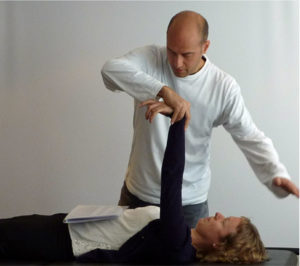 Through feedback based on practitioners’ experiences, META-Health is constantly checking, affirming, adding to or redefining parts of the concept. Other tools have been proving as exact and more suitable for analysis and therapeutic intervention than CT scans [15], while therapy recommendations embrace many kinds of conventional, complementary and alternative medicine alongside META-Coaching.
Through feedback based on practitioners’ experiences, META-Health is constantly checking, affirming, adding to or redefining parts of the concept. Other tools have been proving as exact and more suitable for analysis and therapeutic intervention than CT scans [15], while therapy recommendations embrace many kinds of conventional, complementary and alternative medicine alongside META-Coaching.
The roles of the autonomic nervous system, the “gut brain”, the “heart brain”, the endocrine system and the microbiome, as well as “morphic fields” are being further explored and implemented. It is fulfilling and rewarding to build bridges between different disciplines supporting the mind-body system and to find a growing and abundant treasure of helpful tools to meet an individual’s needs for enhancing their life quality!
Download this article as pdf here: META-Health and GNM
The global organization META-Health International CIC provides a network of professionals and META-Health enthusiasts by:
- publishing the free online magazine META-Healthy Life to educate, convince and empower the world to create well-being
- sharing the living knowledge-base META-Wiki, as well as educative material with her members
- co-organizing meetings and conferences for Health Professionals and for everybody interested in joining our community
- providing an online platform for research, mutual support, and sharing
- maintaining a database of cases for research and study
- defining clear standards for different competence levels for Practitioners and Trainers and a Code of Practice for all META-Health Practitioners
- maintaining and publishing a list of certified META-Health Practitioners ready to help you to transform dis-ease into ease and empowerment
- informing about META-Health events and trainings around the world [16]
References
[1] http://neue-medizin.de/html/ein_vermachtnis.html
[2] https://www.ncbi.nlm.nih.gov/pmc/articles/PMC3312698/
[3] https://www.healmindbody.com/spontaneous-remission-of-cancer/
[4] https://3e-centre.com/
[5] https://www.bartleby.com/essay/Is-Psychology-A-Science-FKEHYJ5T3RZ3W
[6] https://en.wikipedia.org/wiki/Salutogenesis
[7] https://naviauxlab.ucsd.edu/publications/
[8] Compare the articles in META-Health magazine https://www.meta-healthy.life/category/research-science/
[9] https://en.wikipedia.org/wiki/Maslow’s_hierarchy_of_needs
[10] Quotation from https://www.meta-health.info/meta-health/science-and-references/
[11] https://www.science.org/doi/10.1126/science.1233713
[12] https://learninggnm.com/SBS/documents/gnm_therapy.html
[13] https://germanische-neue-medizin.de/wp-content/uploads/Konfliktverlauf.jpg
[14] http://www.neue-medizin.de/html/medikationen.html
[15] https://www.metahealthacademy.com/courses/meta-kinetics/what-is-meta-kinetics-article-4b45ah0q/
[16] Quotation from https://www.meta-health.info/organization/
Picture quotations:
[a] https://germanische-neue-medizin.de/dr-med-hamer
[b] https://germanische-neue-medizin.de/wp-content/uploads/Konfliktverlauf.jpg
[c] https://www.meta-health.info/meta-health/science-and-references/
[d] https://naviauxlab.ucsd.edu/science-item/healing-and-recovery/
[e] https://en.wikipedia.org/wiki/Maslow’s_hierarchy_of_needs#/media/File:Dynamic_hierarchy_of_needs_-_Maslow.svg
[f] https://www.science.org/cms/10.1126/science.1233713/asset/669d2530-79f4-48d8-8c7d-0f50481df616/assets/graphic/339_279_f1.jpeg
[g] https://www.metahealthacademy.com/courses/meta-kinetics/what-is-meta-kinetics-article-4b45ah0q/


Comments are closed.